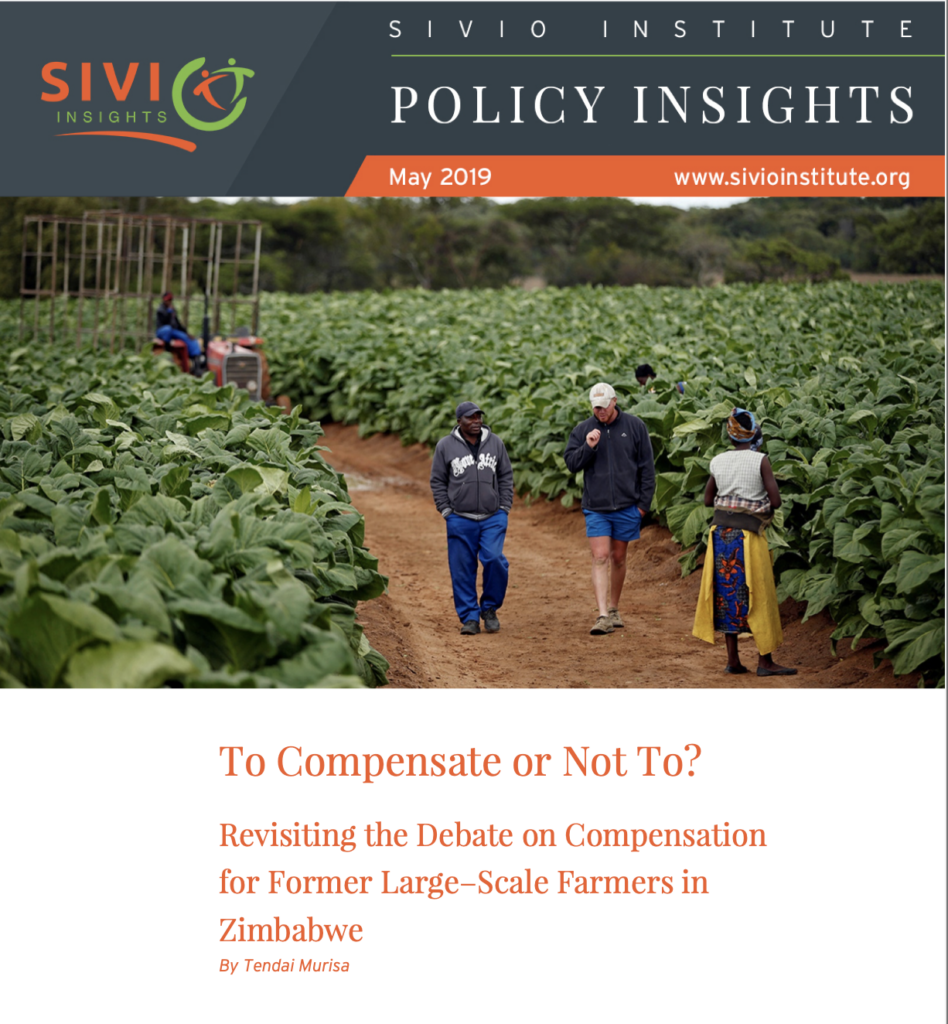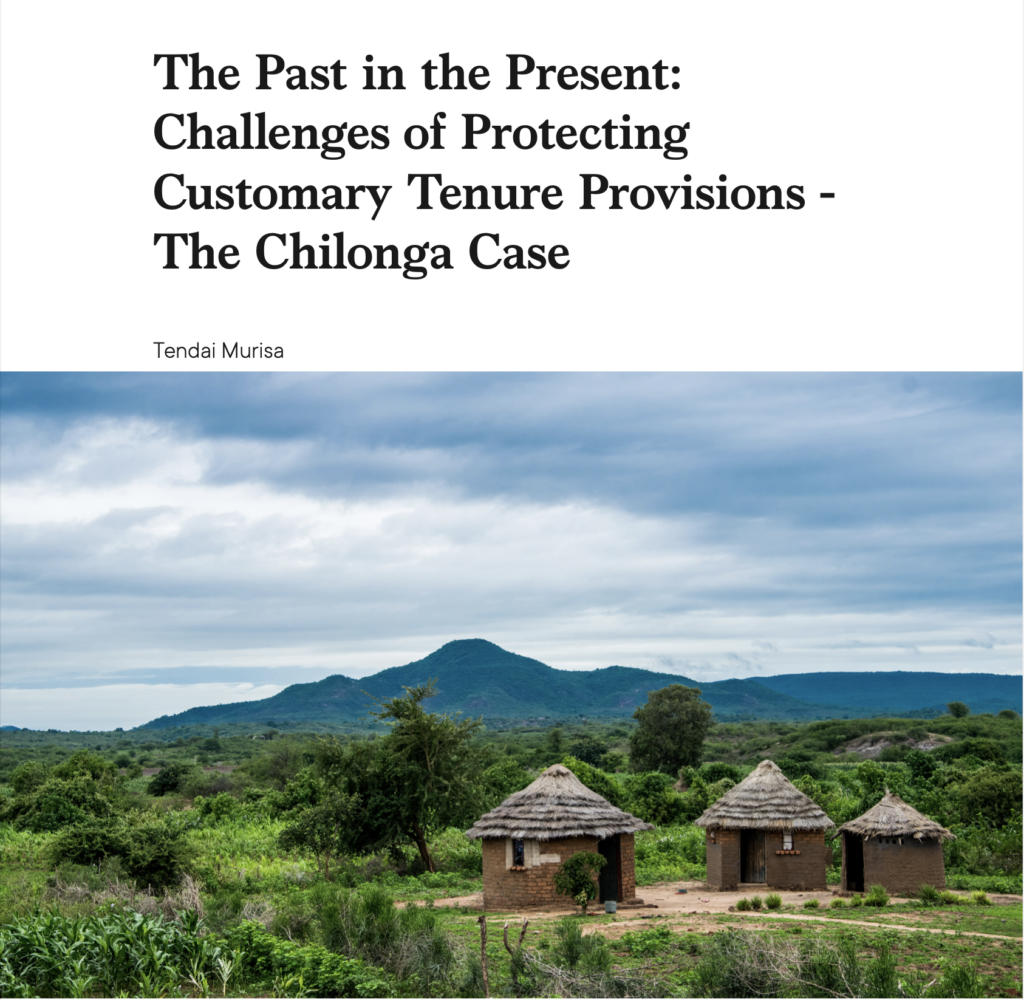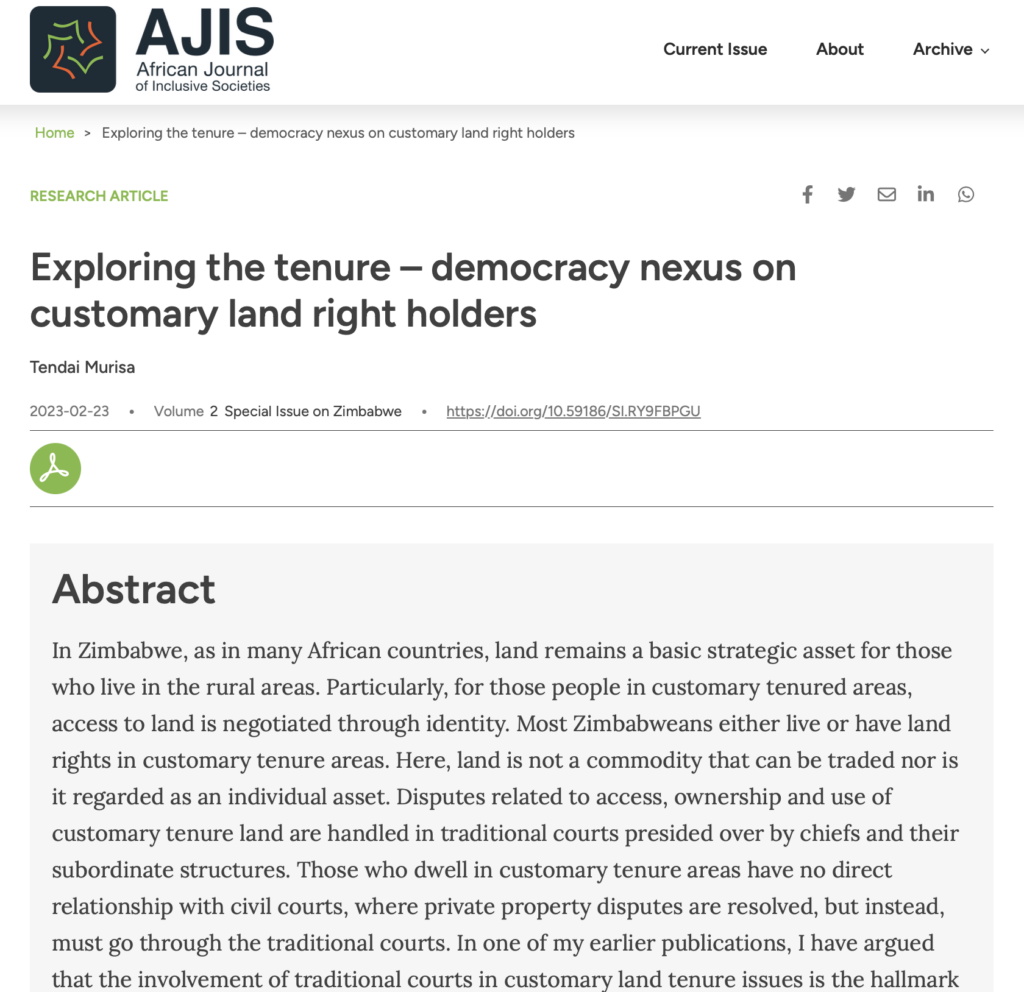Tendai Murisa, 9 October, 2024
Yesterday (8 October 2024), the Government of Zimbabwe (GoZ) announced a major shift on land tenure in fast-track farms. According to the announcement, GoZ intends to issue a bankable form of title to land where the owners of the land can borrow against the land and sell the land or subdivide. The caveat is that the land can only be sold to ‘indigenous’ Zimbabweans. The term indigenous is subject to different interpretations. Nonetheless, this is a bold move on the part of GoZ. A huge departure from what the lease and permits offered. There is a long way to go before the proposed bankable title becomes reality but at least GoZ has provided clarity on the path that it intends to take.
We have argued in other writings (To Compensate or Not To; Exploring The Tenure- Nexus on Customary Land Right Holders; The Past in the Present: Challenges of Protecting Customary Tenure Provisions) that land tenure reforms have been outstanding and the missing link in enhancing productivity and improved farm-based investments. The leases and permits were never given a chance, government was slow/lethargic in rolling them out, to the extent that the majority of those on fast-track farms only have offer letters which can be withdrawn by the Minister of Lands, Agriculture, Fisheries, Water and Rural Development through a letter. There have been contestations in courts around the use/abuse of power by the Minister in effecting withdrawals of offer letters. The proposed changes will hopefully ensure that the new title is not subject to unclear administrative whims of the Minister of Lands, Agriculture, Fisheries, Water and Rural Development.



Many potentially positive outcomes may emerge from this suggested policy change.
- First, it will allow landowners the option to secure financing for their agricultural activities.
- Second, it will potentially allow capital markets to improve their participation in agricultural value chains.
- Third, it will allow for official farm subdivisions to cater for family inheritance or capital raising.
- Fourth, it will create a new land market to cater for those who missed out on receiving land through fast track yet have an interest in farming and adequate resources.
- Fifth, it provides an exit strategy for others who would want to do farming for a defined period and exit as and when their commercial interests change.
These are all options that the current land beneficiaries do not have.
Challenges
However, there are equally many potential challenges that may confront farmers and indeed GoZ if this is passed. The ‘bankable’ feature of the title if not properly managed may lead to a phenomenon commonly referred to as ‘land concentration’ within financial institutions. The current generation of fast-track farmers was used to ‘friendly financing’ arrangements mostly through the government. In its statement, the GoZ raises concerns about its financing arrangements as problematic- in terms of low repayment. What will happen when the same farmers are exposed to private-sector lending? They will have to behave differently to avoid losing their land through repossession. The right to sell/dispose may equally lead to the same challenges- land concentration amongst a few individuals or financial institutions. Furthermore, in the absence of an effective governance framework, the new measures will usher in the same problems of land barons as seen in the cities.
So, what might have led to the policy turnaround?
The government of Zimbabwe cites the need to unlock the economic value of the land. As far back as 2005, Craig Richardson had written about how the fast-track land reform program adopted in 1999 destroyed property rights. The tenure reforms supported by the ongoing attempts to compensate former large-scale commercial farmers potentially contribute towards restoring value in the land under discussion. However, a careful reading of the government’s statement suggests that this could be part of accommodating interest group politics instead of just pure economics. The statement refers to War Veterans as the first cohort to be prioritized in the rolling out of the new tenure arrangements. Furthermore, the whole process of creating this new tenure instrument has been assigned not to the Minister of Finance or Lands, Agriculture, Fisheries, Water and Rural Development, but rather to the Minister responsible for Defence and War Veteran Affairs. Perhaps this is part of responding to demands being made by veterans of the liberation struggle around the inheritance of their fast-track farms or even unlocking the potential value of the farms instead of waiting for government handouts. The war veterans have been at the centre of demands for land reform and most of them benefitted from the redistribution processes. This could be their final contribution to the process of ensuring that beneficiaries have a bankable title or can at least cash in on the land.
Success will depend on some key changes
However, the success of the proposed new title will depend on several interrelated institutional changes within the government. First, there is a need for an agency within or outside of government to be given the mandate just on this. The proposed institution (ideally a land bank) will have an actual survey map and subdivisions of all the farms that were redistributed. All fast-track farms should be handed over to the proposed agency which will make sure they have the correct database of farms and present owners. Some of the owners have unfortunately died and some have abandoned their farms due to economic hardships. There is a need to develop a framework for attaching value to the land. Moyo and Sukume (2005) developed a framework of optimal farm size by natural region. The value attached to the land should be according to the natural region where land in regions with higher rainfall costs more per hectare compared to those in areas with lower rainfall potential. For instance, a hectare in Natural Region 1 could be worth US$500,00 whilst a hectare in Natural Region 5 could cost US$100,00. Furthermore, the new law should also put a cap on the amount of land an individual or corporation can own to curb the challenge of land concentration.
No clarity yet…
Government’s announcement has not yet clarified if the new titles will be issued upon any payment. If it is for free, the government would have missed out on a big pay check and an opportunity to create financial discipline within the farming sector. It would be the largest transfer of property to a group of people at zero cost. Outside of political expediency government would have missed out on an opportunity to resolve the land compensation agreement without external borrowing. The government should start by engaging in town hall-like meetings with land beneficiaries and discussing the mechanism of getting the price right and the modalities of making payments. Furthermore, government should consider ways of slowing down outright land sales, for instance, if the landowner has paid more than 50% of the agreed value, he/she will be allowed to subdivide or sell their farm. If any sales were to happen on land that has not been paid for, the proposed bank will make sure that government receives value through the transactions. These financial resources will help government clear its commitment to the compensation agreement and develop the much-needed infrastructure in and around the farms.
Finally, this could be an opportunity for the government and people of Zimbabwe to undo adverse race-based public decision-making. The refrain to ‘indigenous Zimbabweans’ suggests that others do not belong. For how long shall we continue to operate based on what was done to us-therefore we revenge? Many within the caucasian community have no other country of affiliation except Zimbabwe. It seems we are only ready to accept them when they do well in sports. Could this be the opportunity that we allow everyone who wants to farm the opportunity to do so?
For more writings by Tendai Murisa visit www.tendaimurisa.org or www.sivioinstitute.org
